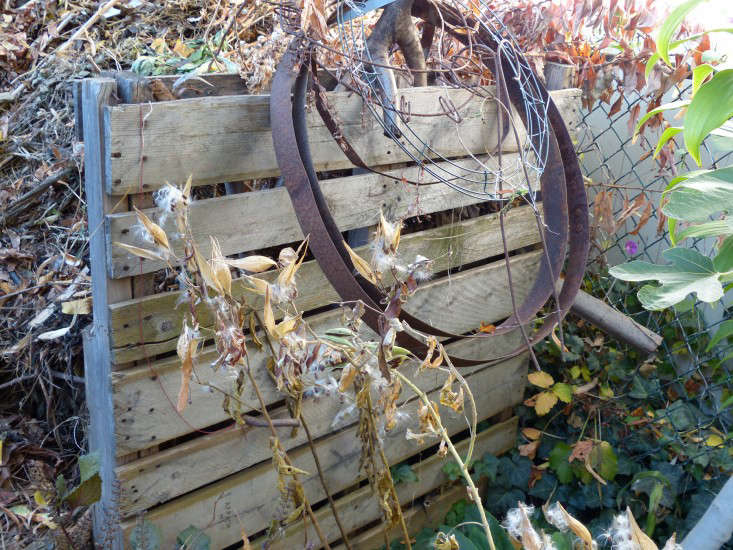Here’s a dilemma. Imagine you are a New York City horticulturalist specializing in garden and floral design, and you are getting married on May 3, 2014. Not only are you getting married, but your wedding will take place very far away in the historic Columbia, Missouri home of your great-great grandparents. You are the third generation to be married there, 150 guests are being invited, and it has to be perfect.
Do you:
- Hire a local florist and hope for the best?
- Consider a minimalist approach with as few flowers as possible?
- Plant 4,325 bulbs in autumn, timing their bloom time next spring with your wedding date?
Over the next few months, we’ll be following Tara Douglass’ adventures in growing her own wedding flowers (all 4,325 of them). Here’s the first installment:
Photographs by Tara Douglass.

Above: If you are Tara Douglass, owner of Brooklyn Plant Studio, you stand up tall and flex your impressive gardening muscles, Not only will you make your own arrangements, you will insure that your flowers are just exactly what you want. You will do this by growing them yourself from bulbs. In Missouri. One thousand sixty-six miles from where you live. Starting now.

Above: Built in 1846, this house is the site of the wedding.

Above: Tara’s Brooklyn garden. While her plan may sound unrealistically ambitious, don’t think that Tara has committed to it lightly. After all, she is a professional, all too aware of the potential pitfalls. You have only to take a look at her personal garden behind her Brooklyn home to see that she has a way with plants and a designer’s eye.

Above: Before selecting her wedding date of May 3, 2014, Tara consulted a number of almanacs and weather forecasting services to make sure the prospects for pleasant weather were good. Calculating how much time she would have if she planted in mid-November, she determined that she needed bulbs that would be likely to be in bloom within five and a half months.

Then came the fun part of studying catalogs and finding the plants that would fit her timing and her white, blue and deep purple color scheme. In the end she ordered a selection of 4,325 bulbs from three companies and had them shipped to Missouri. Her choices include alliums, tulips, muscari, fritallaria, triteleia, actaea, and Spanish bluebells…a veritable who’s who of spring’s greatest bulbs.

Above: Tara in Missouri.
This month Tara traveled to Missouri to singlehandedly plant all 4,325 bulbs over a five-day period. She reported that as she began to dig up the beds she discovered a forgotten clump of iris, which she divided and replanted.
So far Tara has paid $1,300 for the bulbs and says, even with the hours of backbreaking labor involved, she considers that a good deal. It is far below what a commercial florist would charge. If you are curious about which bulbs Tara chose, here are details on a few:
- From Netherland Bulbs, 200 deep purple “Queen of the Night” tulips, priced at 50 for $17.50, and 200 white “Maureen” tulips, currently out of stock.
- From Colorblends Bulbs, 500 Spanish Bluebells; 100 for $31, and 200 Allium christophii, priced at $15 for 25 but currently out of stock.
- From Brent and Becky’s Bulbs, 500 Triteleia, 50 bulbs for $34.50.

Above: Tara’s compost bin, made of industrial pallets.
Because deer are a problem, one whole day in Missouri was totally devoted to planting 500 tulip bulbs into 50 1-gallon pots. Then she buried the pots in the old vegetable garden, which is surrounded by a deer-proof fence. For further protection against tulip munching critters, Tara interplanted the pots with garlic.

Above: Seed heads at the end of autumn.
Now Tara is back in Brooklyn but In early March she will return to Missouri to check on the progress of the bulbs and do a spring cleanup of the property. When she returns again for the May wedding, she will have to hit the ground running. Among the arrangements that will have to be created very quickly are 16 centerpieces, a wedding bouquet, five boutonnieres, and a garland for the front porch. Tara says she will have help from relatives and the use of the vases her late grandmother collected, but it still remains a formidable task.

Above: Rusty metal barrel bands give Tara’s garden a post industrial touch.
What if the flowers don’t bloom in time for the wedding? Tara says she will make use of the foliage. (Check back for updates; we’ll be following her progress all the way through the wedding.) In the meantime, let’s all offer up a little prayer to the weather gods that those thousands of bulbs survive the winter and burst into glorious bloom at just the right time.
To find out how Tara managed growing her wedding flowers long distance and what happened when the big day arrived, take a look at Tara Getting Married Part 2 and Tara Getting Married Part 3.
Want to grow your own bridal bouquet? See DIY: Secrets of Growing Your Own Wedding Flowers and Ask the Expert: 10 Tips for Wedding Flowers from Kate Middleton’s Florist.

















Have a Question or Comment About This Post?
Join the conversation (24)